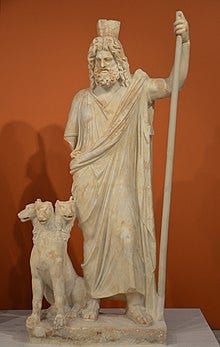(picture by Stability AI)
What a week. When I could resist the sound-shift spreadsheet and generated new words, I made good progress in my translation project. When I didn't resist, I ended up using almost all my time to make changes under the hood, with almost nothing changing in the final result. I guess it could have been worse. I could have had to redo everything. Here are this week’s translations for Wealthgiver.
Bessé, bessérmin!
Welcome, Good.
I had to figure out the verb "to come" for this one.
Iríta Dúba tan vu dísin.
The Sacred Depths Receive you.
This traditional greeting is pretty ominous. Good thing the addressee doesn't understand it.
En Bríese in – opa!
To the Mountain (question particle) -- whoops!
The speaker is an old man with poor balance.
Knéssem Bu. Da delá mi, vas knéssem tsi isté Iú!
I know you. Earth protect me, I know who you are!
The speaker is also senile. Who does he think he's talking to?? Find out below.
Ítim Bu! Daté mi, Iassé ítim
I see you! My master, I see you.
You might notice that Bessian (like Albanian, Greek, and Bulgarian) has three words for "you" where English has one. Actually, more than that, but let's focus on just the plural, when you're speaking to many people or being polite to one. When he said "I know who You are," the old man used the nominative Iú, which is descended from PIE *yūs. You can see how it's related to English "you," and, more importantly, to Albanian ju.
Bu is the clitic or short form of the pronoun. It comes after the verb and is used when the verb is more important in the sentence - "I see You!" The long form of the accusative is Iassé. It goes before the verb - "(It is) You (whom) I see."
Íta mi vu Ádass.
I can see Hades.
Uh oh!
The proto-Indo-European root *weyd- meant “to see.” It’s ancestral to “vision,” “visor,” “wizard,” “wit,” and “wise.” Its negative form with the personal ending would have been *n̥-weyd-eh₂-s, The Unseen One. In Greek, that ended up as Hā́idēs, which in English ended up as Hades. In Thracian, according to the sound changes I’ve identified, the result would have been Ánitēs, later Ada, then Ad (Ád-ass with the definite suffix). “Ánitēs” is my invention, but Ada is a real Thracian name from the Roman period. Of course, it could have come from some other source, but at least in my novel, it’s the name of the god of the underworld.
Iss igán, zoná.
I saw him, woman.
Tambrát ak a tsin támsse uzómin, an ma mi vu iss Ádass!
His grim face with pitch-blackness shrouded, Hades has appeared to me!
The "zom" in uzómin - "shrouded" - is related to Zalmoxis, a god or deified hero, of the Getae, a Thracian people who lived in what is now southern Romania.
Rolstén
Blade-strength
This is a real Thracian name (probably) from the same Ring of Ezerovo I mentioned last time. It begins ROLISTENEASN, which I'm translating as "Rolistenes, I." Like many Thracian names, Rolistenes has two elements, Roli-, which I think is related to rhomphaía, a curved sword, and -stenes, which is either related to or borrowed from Greek sthénos, “strength.”
Ádass kápa na vu it. Kápa na írmin ssi tor, tse dáma ta a idísma. Írmin kápa ta man idíset
Hades has appeared to us. He has come to us as a gift, and we must receive him. He has come to receive me.
The reflexive verb dísam vu, here translated as "receive" means "to take or accept something as a gift,” or to receive someone as a guest. It is cognate to the -dek- in Greek Polydektes, "host of many", an epithet of Hades.
Ádass na kápa vu it.
Hades has appeared to us.
More on reflexive verbs. English has a sad, weak little system of adding “-self” to pronouns to make verbs reflexive - “I see myself.” But Ancient Greek (and modern Greek and other modern Balkan languages) have a much more interesting system that English has lost: the "mediopassive" or "middle voice."
I often see signs in Greece that say "POLEITAI FOR SALE." Poleitai literally means "being sold" or "selling itself." This is a mediopassive verb. The the current owner of the property (the “actor”) isn't important; what we care about is the property being sold (the “patient”). The closest English comes is sentences like "the chicken is cooking," which does not mean you have trained a bird to be a chef, but means that the corpse of a hen is undergoing a process which will result in dinner.
In the case of the Bessian verb "to see," you can say ítim Áda - "I see Hades" - or you can say Ádass mi vu íta - "Hades is seen by me" or “I can see Hades” "Hades is visible to me." As with Greek and Albanian, some Bessian verbs have special mediopassive forms, but ítim doesn't. It's reflexiveness is only indicated by the particle vu.
Dínin batsór an ésta?
Is (this) nettle soup?
This one gave me enormous trouble, because there's just a little bit known about the paleo-Balkan origins of the word "nettle" and I had to make a theory that fit the facts before I could figure out the Thracian word.
In case you're curious, here are the known words:
Dacian: diký, dyn
Ancient Greek: adíkē, knī́dē
Latvian: nātre
There are also many tantalizingly similar words in Greek, Albanian, and Balto-Slavic languages related to scratching and itching, which seem to point to the protoform *kes-n-. Add the resultative and the diminutive neuter suffixes and you have *ksn̥-dʰeh₁-kon, "the little thing that becomes scratchy." A nettle. Adding some weight to this interpretation is the fact that my sound-change spreadsheet already had ksn̥-C > ə-C > 0-C. That one took all morning.
Iái kness.
He knows.
Yes, that's the same kn- beginning as in English "know," and for the same reason.
Kness vu tamssáta. Ádass na vu íta.
The darkness knows itself. Hades appears to us.
The old man's habit of repeating himself makes him an excellent language teacher.
Tsi dass?
What are you doing?
What indeed, old man!
Subscribe and find out next week.






